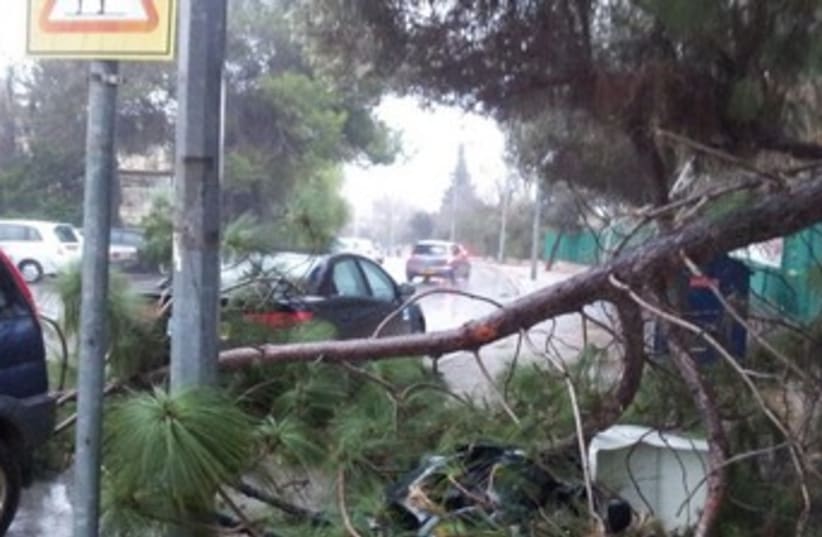
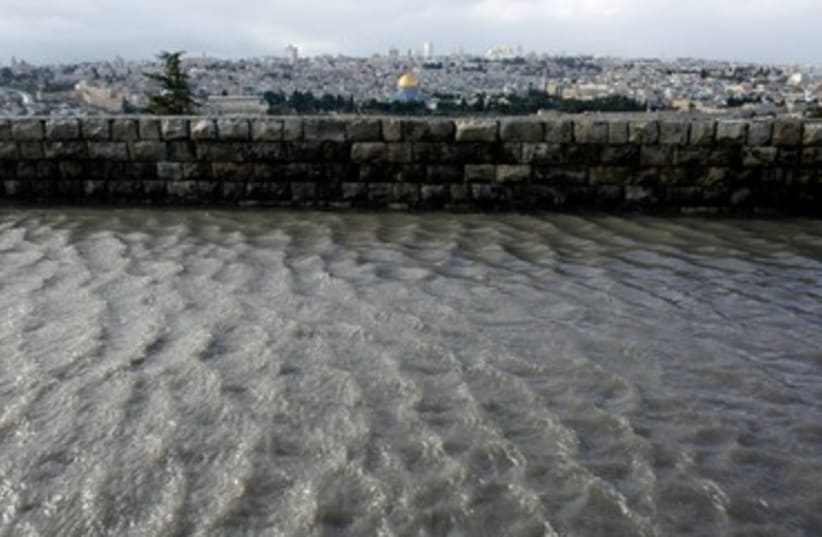
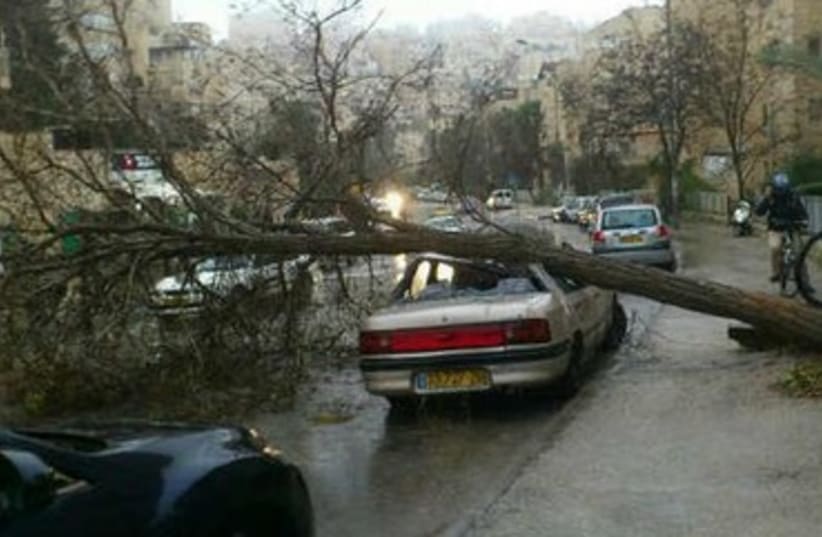
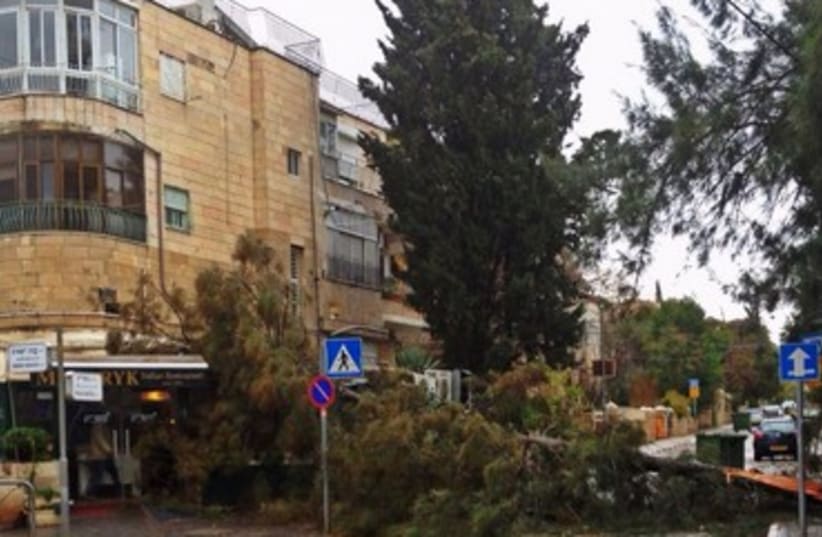
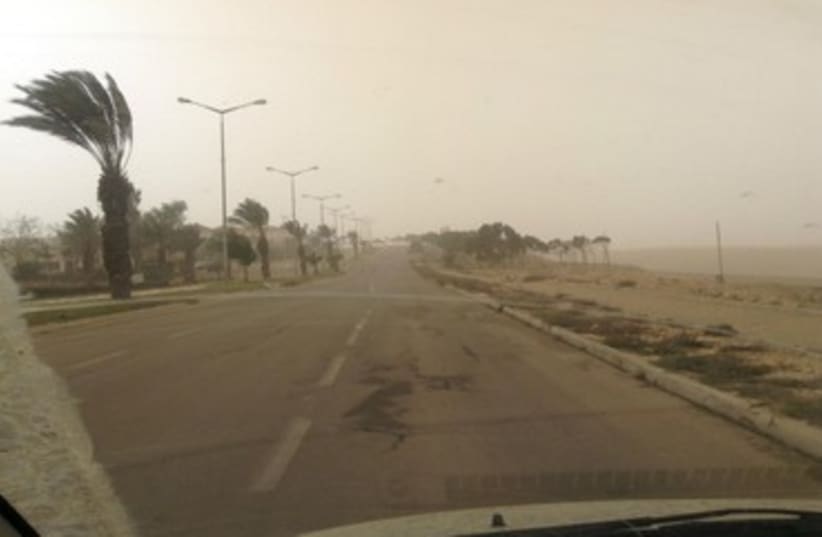

Showers and storms pounded nearly all of country, with extremely strong winds – of up to 85 kilometers per hour from the North down to the Arava, decreasing to 35 kph in Eilat, according to Israel Meteorological Services (IMS).Snow continued to fall over the Hermon, closing the area’s ski resort, and temperatures dropped to colder than usual all over the country.Ongoing flooding plagued coastal towns, while the riverbeds of the South, Jordan Valley and the Judean Desert faced flash floods, the IMS said.Meanwhile, flooding incidents shut down roads all over Israel – including major highways like Road 4 and Road 10.As in previous winters, Modi’in’s Azrieli Mall was completely flooded on the first floor, causing police and firefighters to evacuate all the stores. Eyewitnesses described water streaming into the mall, creating a veritable river through the building.No one was injured and shoppers left the building without incident.“Stormy weather caused flooding to the municipal drainage system, leading to the overflow of water in some areas of the mall,” an official response from the Azrieli Group said, as of Monday afternoon. “To ensure the safety of visitors, in the coming hours the mall shall be drained of water and will reopen as usual.”Driving past the mall early Monday evening, Modi’in resident Leron Altman told The Jerusalem Post that she saw piles of sandbags lining the sides of the building. Aside from the situation at the mall, she said she saw many muddy pools all over the city’s construction sites and vacant lots.In Jerusalem, firefighters scrambled to deal with downed trees, some of which fell against electricity towers, causing damage. Firefighters also cleared away downed antennas and trees that had fallen on cars across the city, as periods of rain alternated with bouts of hail.In a rather empty Mahaneh Yehuda shuk, merchants cheered, mostly with boredom, every time the hail started to pound earnestly on the plastic roofs of the shuk’s stalls, creating an incredible racket. A resident of one older apartment in Nahlaot said she was running out of towels mopping up leaks and that the wind tore her balcony’s sun cover to shreds.If the storm maintains its current intensity over the week, Jerusalem may experience snow on Wednesday, and the city has therefore been increasing preparations for that possibility. The municipality was also providing temporary lodging for its homeless residents during the storm.Side effects of the storm likewise rattled the city of Tel Aviv-Jaffa, with 217 problematic events already taken care of by the city by midday Monday. The municipality had treated four flooded apartments, seven flooded yards, one flooded land plot, 55 fallen trees and branches, 21 road obstacles, 20 fallen lights and signs, 13 holes, 11 blocked antennas, three sewage issues, 10 fallen building parts, five fallen roof objects, 16 torn electricity cables, one fallen fence, four road erosion incidents, 20 problematic road puddles and five telecommunications issues, the city said.The Tel Aviv Municipality warned drivers and pedestrians that there are issues with traffic light systems in many parts of the city. Meanwhile, at a building site at the corner of Rothschild Boulevard and Nahalat Binyamin, a crane had fallen and hit glass on the building next door, according to the city.In anticipation of the storm, the municipality said it had been making constant preparations for the potential ravages of the stormy weather and increased the presence of all of its operational teams as well as social services staff to distribute blankets and hot drinks to the homeless. In the past few years, the city has been giving increased priority to preventing flooding during the winter season, particularly with the entire overhaul of the urban drainage and sewage systems in most parts of the city. The municipality is also working in cooperation with the Ayalon Highway Company to handle the possibility of flooding on the Ayalon.Just north of Tel Aviv, the Herzliya train station, which had been closed since midday Sunday due to flooding, began operating again at about 12:30 p.m. on Monday, a spokeswoman from Israel Railways said. The company, however, warned travelers that trains would be moving slowly due to the weather throughout the duration of the storm.Outside of the Jerusalem and Tel Aviv regional hubs, the Health Ministry warned that due to the possibility of contaminated storm run-off mixing with drinking reservoirs, residents near the Dead Sea – including Almog, Kalya, Beit Ha’arava, Avnat, Vered Yeriho and tourist sites in the area – should boil their water for a minimum of two minutes until further notice. In cooperation with the regional council as well as Mekorot National Water Company, the ministry said it would continue to conduct testing.The Health Ministry also warned against swimming in the nation’s beaches, due to the possibility of contaminated runoff in the waters.In the West Bank, heavy rain and lightning damaged 19 houses on Monday in the Al-Janeed area, west of Nablus, causing considerable damage to the properties, Palestinian news agency Ma’an reported. Torrential rain also fell from Sunday into Monday in Tulkarm, flooding homes and roads throughout the town, according to Ma’an.While heavy winds had not yet caused any damage to crops in the central Arava Desert region – which supplies 60 percent of the country’s fresh produce exported to Europe – the area’s leaders stressed that it is crucial that farmers continue to reinforce their greenhouses and brace their crops.“Right now it’s reasonable,” Eilon Gadiel, director of Arava Research and Development, told the Post on Monday afternoon. “It doesn’t mean it’s not going to change, but I hope for the best.”In the Galilee, however, farmers estimated that the thousands of dunams of crop damage occurring there through flooding and subsequent rotting has already amounted to millions of shekels. Although the rains are bringing significant amounts of water to help farmers with irrigation, they are also destroying crops, particularly in the Hula Valley region, according to the Galilee Development Company, a firm jointly owned by 33 Galilee kibbutzim.By Monday evening, the company reported 2,000 hectares of agricultural land in the area had been flooded – sites where wheat, carrots, onions, peas and other crops are prevalent.Because the tremendous amount of rainfall has fallen in a very short amount of time, the soil drainage systems have not been able to properly absorb the water, explained Ofer Barnea, agricultural operations director at the Galilee Development Company.The current state of the region is reminiscent of a similar incident that the Galilee experienced in 2003, during which the area lost millions of shekels, Barnea stressed.“I guess toward the end of the week we will be able to better evaluate the damage,” he said.In addition to the human agricultural losses, the cranes that are supposed to be feeding at the moment from seeds and seedlings in the Hula Valley are now seeing their food supply damaged as well, Barnea explained. The farmers, he said, are working to find a solution to this problem as well. Thus far, about 100 millimeters of rain have hit the area in this storm, he added.Also in the North, the Kishon River was overflowing by afternoon, and the Kishon River Authority said it was taking pains to prevent the mixing of factory sewage with the now rehabilitated river.While much of the nation faced the inconveniences – and sometimes dangers – of the storm, Lake Kinneret was reaping its benefits. By Monday morning, the Kinneret basin’s level was at 211.72 meters below sea level, 10 cm.above that of the morning before and still 2.92 meters from being full.Throughout the country all day, Israel Electric Company teams were working under the harsh weather conditions to fix the damage caused to the power grid lines by the storm. Most of the damage caused by the storm thus far was related to tree branches collapsing on power lines, causing them to tear, according to the company.It is likewise crucial that the public take certain safety precautions, such as removing storage units that can fly away from balconies and hit electrical wires, and making sure that window shutters are connected properly to the buildings, the IEC said.In addition, if there are broken electrical wires in the street, it is critical to refrain from touching them, due to risk of electrical shock. Any torn wires should be reported immediately to the IEC at *103 or to the police, the company stressed.Going forward, the IMS predicted that on Tuesday, thundershowers would continue to drench the country’s North and Center, along with extremely strong winds and snow over Hermon. The ongoing risk of floods and flash floods will likewise persist, and by Tuesday evening the rain will spread to the South and to Eilat. Also in the evening, snow will likely begin to cover the peaks of northern mountains as well as possibly those of the central mountains.By Wednesday, the IMS forecasted that showers and storms would cover nearly the entire country once again, with a continuation of the extremely strong winds and further temperature drops. Snow will likely fall over Mount Hermon, the northern mountain peaks and the central mountain peaks – including Jerusalem. The risks of floods and flash floods will also persist, and there will be a chance of snow in the Negev mountains.On Thursday, the showers and storms throughout the country, as well as the strong winds, will likely continue, as will the chances of snow in the northern and central mountain peaks, including those of Jerusalem in the morning, the IMS reported.The rain will begin decreasing in amount and weakening in intensity by the afternoon, but there will still be flood and flash flood risks, as well as very cold temperatures, the IMS said.
